Student Blog
Silvia
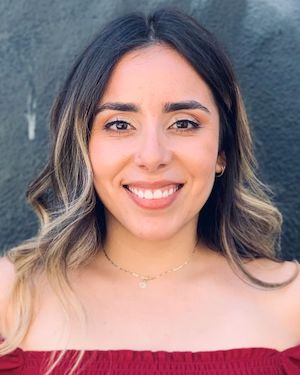
10 tips from me to you ⟩
December 20, 2021, by Silvia
My DMs — and by DMs, I mean email — have been poppin’ with variations of the same question: “Any advice/tips regarding the program or in relation to pursuing higher education?”
To be completely honest, I don’t know how I have made it this far. I guess it really is fake it till you make it, am I right? When you’re a first-gen student not only do you not have people to guide you through this journey, but you also don’t know what questions you should be asking to those that may be able to advise you. There’s a lot that I wish I would have known before romanticizing the idea of being the first in my family to go to college, pero no pasa nada oiga. Ya estamos aquí, y lo que me toca a mi is to share some of the things that have helped me thrive as a student and person. I’ll preface the rest of this blog by saying that these are general tips that I have put together as I look back on my academic career, but feel free to reach out for more specific advice if you need.
Okay so here we go, Blogmas day 10 = 10 tips from me to you. 😊
10. Develop a morning routine
Morning routines are your friend. When I started the program, it was completely online, which made it easy to wake up minutes before class, roll over, grab my laptop, and log on from bed. It also made it easy to fall right back to sleep . . . oops. Needless to say, this was not a productive or effective start to my school day; I felt like I needed to do something to feel awake and alert for class in the mornings. One day I decided to wake up early to work out before class and let me tell you, it was life changing. I live by my morning routine and think we should all have one. Some one told me that there are two instances during which we can have the most control over our days — you can’t control what happens throughout your day, but you can decide how you start and end your day (for the most part). I choose to start my day with a morning routine because it sets the mood for the rest of my day and makes me feel accomplished from the get-go.
Silvia’s morning routine: wake up between 6:00 AM – 6:30 AM, do a 20-minute workout, drink a cup of water + coffee or tea, do my skincare.
9. Sleep
Raise your hand if you’ve ever been told to get a good night’s sleep before an exam because you’ll do better than if you stay up late trying to cram . . . but you still chose to stay up? I won’t raise my hand because I don’t believe in pulling all-nighters. In undergrad I may have pulled one or two, but since starting OT school, I don’t compromise my sleep. Listen to NPR’s Ted Radio Hour podcast “Maslow’s Human Needs” starting at 6:30 — you can thank me later.
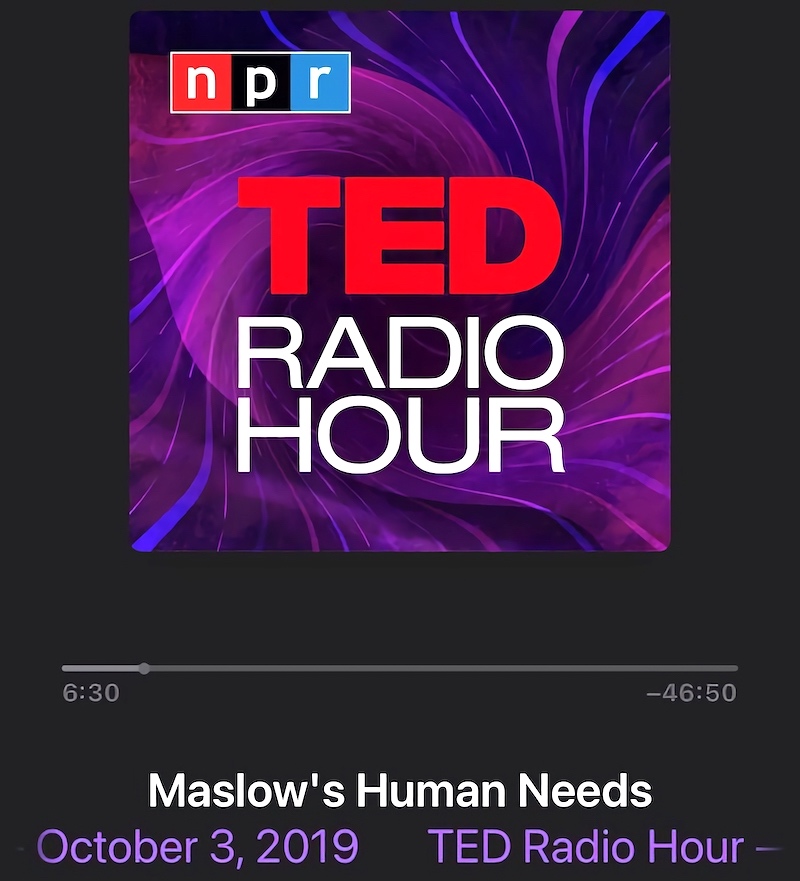
NPR Ted Radio Hour
8. Take a mental health day
That’s it. That is the advice. Don’t go to school, don’t go to work. Take a mental health day.
7. You don’t have to be productive every day
The student urge to make a to-do list of everything they want to get a head start on/finish when they have a day off is real. It’s me, I’m student. Last semester I had class Monday-Wednesday and fieldwork on Fridays. Thursdays were my free days and when I tried to be as productive as I could by getting ahead on readings or finishing assignments, on top of doing ambassador work. Some days though, I was tired and didn’t want to do any schoolwork. At first, I would beat myself up for wasting my day doing “nothing,” thinking it wasn’t “productive.” Truth is, we’ve been conditioned to think that we must always be working or on-the-go, that giving our bodies a rest seems unacceptable. But, in the wise words of my friend Amy, “It’s ok. You don’t need to be productive every day.”
6. Set boundaries
I’m not sure that I do this too well, but Kim said I do so I’m listing it here. Basically, check in with yourself and be realistic of how much you can handle. If you need to say no to something, or push a commitment back, do it.
5. What works for you, works for you
One thing about my cohort is that we help each other out. Everyone shares their study materials — whether it is a Quizlet or a study guide — and I love them for this. However, I can’t stress how important it is to know that what works for them may not work for you and vice versa. When my friends started sharing their study materials for an exam that I hadn’t even thought of, I became anxious, and the impostor syndrome kicked in. Was I smart enough or competitive enough to be in this program? I had to give myself a pep-talk to remind myself that we have all gotten here doing things differently and what works for me, works for me, anything beyond that can be used to supplement my study skills and habits. Let me know if you need a pep-talk.
4. Plan your days
I use my planner religiously. Even if my days look the same every day, I write down my schedule to a T, and try to stick to it as much as possible. Similar to my morning routine, this gives me a sense of control over my day, and there’s just something so satisfying about crossing things off as you go through your day.
3. “Not my best work” is good enough
If I had a dollar for every time I turned something in last semester and said, “that was not my best work,” I would have a lot of money, still not enough to pay my tuition, but enough to kick off my last semester of grad school with a girls trip.
For real though, doing the bare minimum is good enough sometimes. If you want to have a life outside of school, while still being a “good student,” you’re going to have to learn to prioritize which assignments need to be your best work, and which don’t. If it is a credit/no credit assignment do not spend more than an hour on it (and that’s pushing it).
2. Fake it till you make it
Pretty self-explanatory, I think.
1. Grades don’t matter
Ok, they do . . . but not really. All I can tell you is that if you’re debating between 1) depriving yourself of your favorite and restorative occupations to stress over studying to get an A, or 2) studying modestly while also balancing your other occupations and getting a B, do the latter. There’s more to life than school. You’re still going to graduate and become a great occupational therapist.
Alright friends, that’s it. I have to get back to babysitting but I’ll be back for Blogmas day 2!
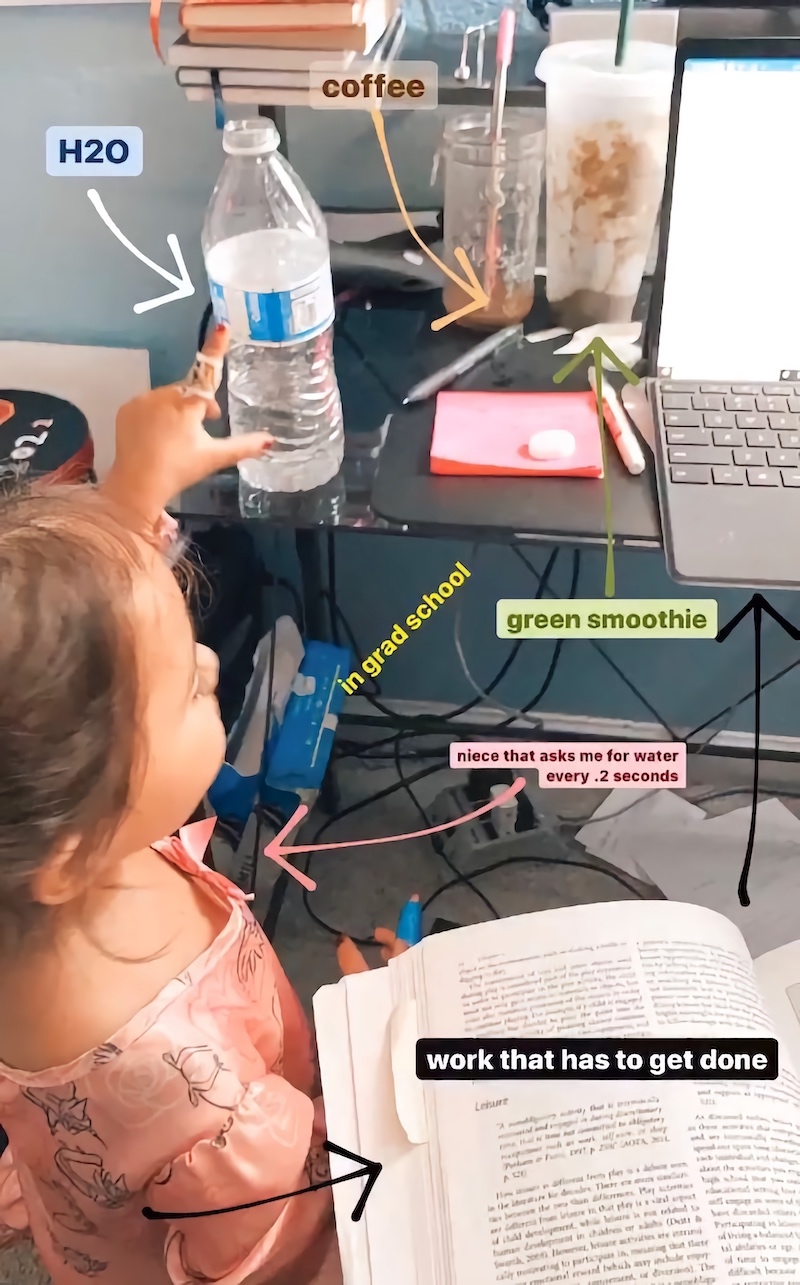
Zoom University days with my niece, Demi
⋯

La Primera, Pero No La Ultima ⟩
November 9, 2021, by Silvia
To my sisters and to the siblings of other first-generation students: you belong here. We may be the firsts, but we won’t be the lasts.

Hermanas, I will hold your hands every step of the way — Photo by: fatimajphotography
“Everybody looks rich and smart” — An observation of the USC Village made by my sister.
Sis — do I look rich to you? Maybe a little smart, but rich? Talk about a “she doesn’t even go here” moment. I think about this moment a lot because reading between the lines it means that she can’t fully believe that I do go here, and even more upsetting, I don’t think she sees the possibility of herself going here either. This speaks to feeling like you don’t belong in certain spaces because when you look around, there isn’t many, if any, people who look like you. Though her description may not encapsulate everyone who goes to USC, her feelings and thoughts are valid. I, along with many other first-generation students, have felt this way throughout our collegiate journey.

Graduating Undergrad as 1st Gen — Photo by: Madison Noelle Photos
When I tell you that immigrant, three-year-old, non-English speaking me could have never imagined being here today — finishing my master’s degree at the top OT program — I mean it. Growing up, college was never a topic of conversation in my house, yet education was always emphasized to be the key for a better future. Getting good grades was expected and not something to be rewarded for — the one time I asked my mom if I could get an allowance for having straight As she was quick to say “. . . mira mira, ya parece que te voy a dar dinero por hacer tu trabajo en la escuela . . . esa es tu responsabilidad.” Being a good student was my responsibility and something I took great pride in. Subconsciously, it was also something I held onto with the hopes of getting into a “good” college one day.
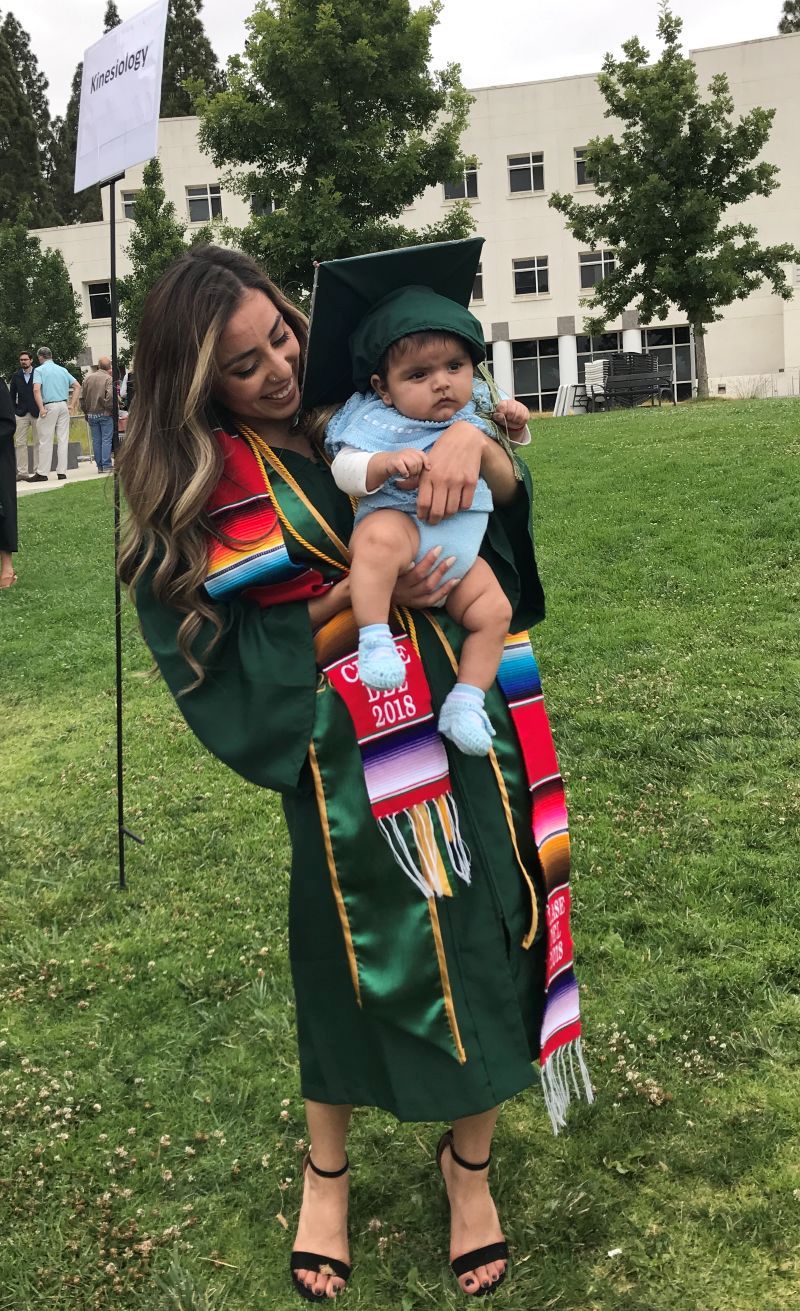
Baby Meeks and I at our undergrad graduation
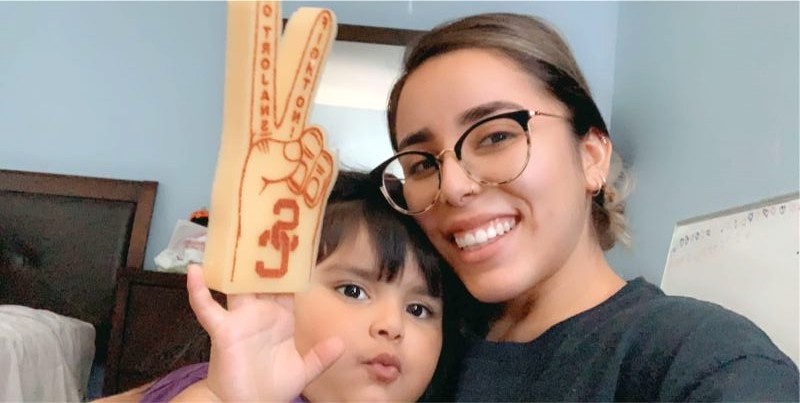
3 year-old Meeks and I celebrating the end of the summer semester
Going to college is such a romanticized notion though . . . from choosing your dream school, to moving away from home, living in a dorm, meeting the people who will become your lifelong best friends, and everything else that you daydream about until reality hits. How do you get to live all these experiences when you don’t even know the name of any universities (besides the ones stamped onto the sweaters your classmates wore), when you don’t know how/where to apply, when you’re poor and probably can’t even afford to live these experiences? I remember asking my dad if he had a savings account because, if I decided to go, college would be really expensive. He didn’t give me a clear answer but assured me that if I wanted to go to school, we would make it happen. In his words, “Hay mucho sacrificio que se tiene que hacer, pero independientemente de eso, [mientras que tenga el apoyo de todos, yo puedo] salir adelante.” Needless to say, pursuing higher education has been a very tiring journey.
It’s almost like being completely lost in the application process and scared that somehow you incorrectly inputted something in your FAFSA is a rite of passage for first-generation students. And I know for a fact that this isn’t true for all college students because I can name some of my high school peers whose parents did everything for them — but that’s besides the fact and my point is simply that we’re not all on an equal playing field. Being first-gen means figuring it out on your own and paving the way for those who will follow after you. Though this is rewarding, it is exhausting.
No one really talks about the culture shock that you may experience, the impostor syndrome, the burnout, the guilt, and all the other not-so-good things that come with college and that are compounded by being first-gen. Fully unpacking what it means to be first-generation, however, cannot be done in one blog, so stay tuned for the sequel. But I don’t want to end this blog without acknowledging that in the process of chasing and living out this dream of being the firsts in our families to go to college, we often lose sight of who we are and what we want. We carry the hopes, dreams, and sacrifices of our parents and families, which fuel our academic drive but also hold us back from other things we want to do with our life. So, I encourage you to check-in with yourself; what do you want?
⋯

Survivin’ ~N~ Thrivin’ ⟩
October 21, 2021, by Silvia
Life Hacks School/Life Balance
Ok, full disclosure, I was not thriving last week . . . or the week before that.
Sometimes life is just hard, you know. You may have big assignments due, an application to submit, an exam (or two) to take, and work deadlines to meet — all while you’re trying to resolve family issues, your printer decides to stop working, your computer crashes, and your ex has the audacity to text you and ask how you’re doing. Two or three of these things I can handle, but all of them together felt a little excessive.
And here’s the thing about me, I do not handle being stressed or overwhelmed very well. My go-to coping strategy is to eat ice cream with under-baked cookies and watch Mulan, which is not exactly the answer I gave during my OTD interview — but that’s besides the point. What I am trying to say is that the first half of October was rough. I had so much going on that I felt like I was just doing and not being. Honestly, a lot of us felt that way (per the brief research I conducted, aka my “Surviving vs. Thriving” Instagram poll) and maybe you are feeling that way right now. If you are, I want to say this: there is more to life than this moment, let it go and let it be.
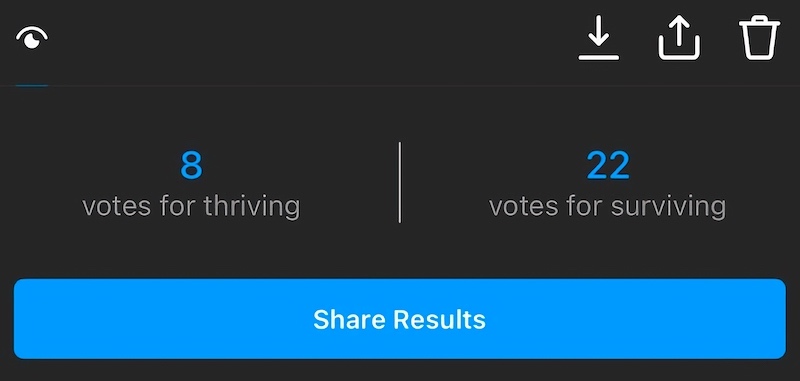
Data from my very (non) scientific research
Like many things, this is easier said than done, I know. It took me having a mini emotional and mental breakdown to finally give myself some grace. I don’t always have to have it all together, and neither do you, but I do think that we should always be kind to ourselves — and this is something I am working on. On the days where I feel defeated, I stop and tell myself that there is more to life than what I am feeling right now, I think about all the things that make me happy and give me life, and I give myself credit for how far I’ve come. I affirm myself.
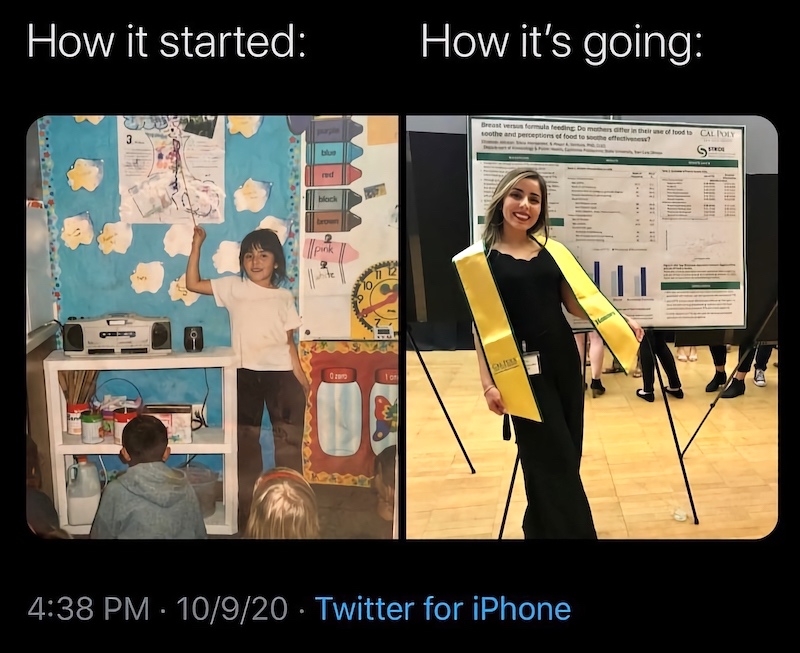
How it started vs. How it’s going . . .
When I do this, I realize that I truly am thriving. I am living in a new city, meeting beautiful people, making new friendships, halfway through the master’s program, and pursuing a doctorate (ok, this one is contingent on being accepted, but speak into existence ok).
Life is about perspectives, and how you choose to look at things may shift the way you view surviving and thriving.
⋯

Dear Zoom, it wasn’t you ⟩
September 14, 2021, by Silvia
I’m just going to say it — I miss Zoom University.
Zoom University and I had a toxic relationship and although it wasn’t my first, it certainly is the only one I miss. Sometimes you really “don’t know what you have till it’s gone.” Don’t get me wrong; I love being on campus, seeing all my beautiful friends, and making real-life connections with my professors, pero like*. . . it’s hard out here.
Before making the transition back to in-person classes, after over a year of Zoom, I never truly realized or acknowledged how much work it takes to be an occupational being, aka a student. Let’s just consider some of the things that we didn’t have to do when Zoom was part of our lives (or at least my life):
- Get ready in the morning (if you still did this, I am proud of you and I admire you)
- Prep lunch
- Pack bag(s)
- Leave the house
- Drive to campus
- Find parking
- Walk to class
- Sit in class
- Actually pay attention in class (R.I.P mute and camera functions)
- Socialize
I’m sorry, but the fact that I can’t get up and walk to my fridge for a quick snack or mute myself/turn my camera off and lay down on my bed for a second is rude. Also, do you know how intense my phobia of getting stuck in LA traffic on a school morning is? Ok never-mind the phobia, have you seen those gas prices? Seriously though, transitioning back to in-person classes has been quite an adjustment that I wasn’t fully prepared for.
As much as I hated being confined to Zoom at home, I had a greater sense of control over my entire school experience and I loved that about our relationship. I didn’t have to worry about traffic, whether or not I would find a parking spot, or being late for that matter. I could monitor the sound level, air temperature, light intensity, number of guests—basically everything that I have absolutely no control over in the underground lecture hall, G 37. G 37 induces sensory overload in my body and exhausts me; it makes me reminisce the good times with Zoom.
I feel guilty for hating Zoom so much when all it did was love me and be there for me through the hard times, aka the pandemic. Yes, it gave me migraines and worsened my vision, but it also let me sleep in, eat during class, lay down between lectures, and spend my money on things other than gas. If I am being honest, it wasn’t Zoom, it was me. I was so upset and stuck on the idea of being “robbed” from my graduate school experience that I didn’t value or appreciate all the good things Zoom had to offer. I thought I was ready to move on—to be 100% back in-person and on campus—but what the heart wants is not always what the body wants or needs. While my heart is happy to finally see and meet my cohort and class in real life instead of a square on a computer screen, my body is tired and needs time to adjust.
I know I am not the only one feeling this way, and I just want you to know that you have permission to miss Zoom too. Listen to your body, allow it to rest and recharge as it adjusts to yet another change.
*Common Spanglish phrase meaning “but like”
⋯

Occupational Therapy, but Make it Dramatic ⟩
September 2, 2021, by Silvia
Admissions First-Gen What are OS/OT?
I’d be lying if I said I wasn’t dramatic but being dramatic is what got me here, kind of.
You see, the moment I decided I wanted to go to college in the first place was very movie-like. I was a junior in high school when my family drove to Tijuana, Baja California for a weekend trip. I sat in the back of our Yukon with my head leaning against the window staring into the distance, probably contemplating my life, when I saw it. There it was written on the building: “UCSD School of Medicine.” I don’t know if you believe in signs, but this was mine. I was destined to become a doctor.
When college application season came around, I had no idea what I was supposed to do — I didn’t even know what a major was (the first-generation in me was showing). One day I was randomly talking to a girl in my class about what school she was applying to and what “major” she had chosen. This is when I discovered kinesiology and loved everything about it. Naturally, I changed my mind and decided I wanted to be a physical therapist, which was fine right? After all, it was still a career in the medical field. So, there I went applying to Cal Poly SLO and declaring kinesiology as my major. I was really going to college you guys.
When I got to college, we had an orientation into the major. That’s when I first met Dr. Clark. Dr. Clark began his introduction by telling us that we were going to start off wanting to become physical therapists but would leave the program wanting to be occupational therapists. I didn’t believe him until I failed chemistry. Imagine this: I get into my dorm, log onto my student portal, check my grade, and begin crying as I slide down the door in slow motion thinking I’m going to be kicked out of the university for failing a class. I could have won an Emmy or an Oscar. After I got it together, I realized that I was fine, everything was fine, and I didn’t need chemistry in my life anyway. I decided to change my academic track to one that didn’t require me to take the organic chemistry series and that is how occupational therapy popped up once again.
The more I learned about occupational therapy through my own research and volunteering experiences, the more certain I became that it was what I wanted to do. Occupational therapy highlights the humanity of an individual and recognizes that they are more than a label or diagnosis. We help individuals identify what is meaningful to them and their lives and develop a holistic approach to meet their goals and needs. I’ve come to understand that it’s not about what I do (i.e., deliver medical services) but about how I do it (i.e., being client-centered) that draws me to this field.
So, be a little dramatic, for all you know you may stumble upon your dream career.
⋯





